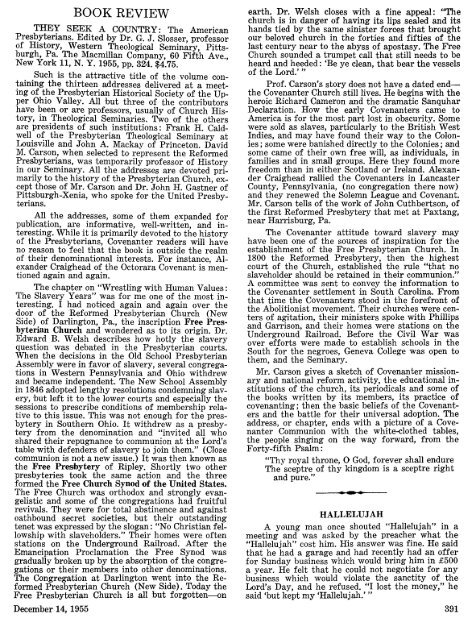Covenanter Witness Vol. 55 - Rparchives.org
Covenanter Witness Vol. 55 - Rparchives.org
Covenanter Witness Vol. 55 - Rparchives.org
You also want an ePaper? Increase the reach of your titles
YUMPU automatically turns print PDFs into web optimized ePapers that Google loves.
slaveholders."pure."money,"BOOK REVIEWTHEY SEEK A COUNTRY: The AmericanPresbyterians. Edited by Dr. G. J. Slosser, professorof History, Western Theological Seminary, Pittsburgh, Pa. The Macmillan Company, 60 Fifth Ave.,New York 11, N. Y. 19<strong>55</strong>, pp. 324. $4.75.Such is the attractive title of the volume containing the thirteen addresses delivered at a meeting of the Presbyterian Historical Society of the Upper Ohio Valley. All but three of the contributorshave been or are professors, usually of Church History, in Theological Seminaries. Two of the othersare presidents of such institutions: Frank H. Caldwell of the Presbyterian Theological Seminary atLouisville and John A. Mackay of Princeton. DavidM. Carson, when selected to represent the ReformedPresbyterians, was temporarily professor of Historyin our Seminary. All the addresses are devoted primarily to the history of the Presbyterian Church, except those of Mr. Carson and Dr. John H. Gastner ofPittsburgh-Xenia, who spoke for the United Presbyterians.All the addresses, some of them expanded forpublication, are informative, well-written, and interesting. While it is primarily devoted to the historyof the Presbyterians, <strong>Covenanter</strong> readers will haveno reason to feel that the book is outside the realmof their denominational interests. For instance, Alexander Craighead of the Octorara Covenant is mentioned again and again.The chapter on "Wrestling with Human Values :The Slavery Years" was for me one of the most interesting. I had noticed again and again over thedoor of the Reformed Presbyterian Church (NewSide) of Darlington, Pa., the inscription Free Presbyterian Church and wondered as to its origin. Dr.Edward B. Welsh describes how hotly the slaveryquestion was debated in the Presbyterian courts.When the decisions in the Old School PresbyterianAssembly were in favor of slavery, several congregations in Western Pennsylvania and Ohio withdrewand became independent. The New School Assemblyin 1846 adopted lengthy resolutions condemning slavery, but left it to the lower courts and especially thesessions to prescribe conditions of membership relative to this issue. This was not enough for the presbytery in Southern Ohio. It withdrew as a presbytery from the denomination and "invited all whoshared their repugnance to communion at the Lord'stable with defenders of slavery to join them." (Closecommunion is not a new issue.) It was then known asthe Free Presbytery of Ripley. Shortly two otherpresbyteries took the same action and the threeformed the Free Church Synod of the United States.The Free Church was orthodox and strongly evangelistic and some of the congregations had fruitfulrevivals. They were for total abstinence and againstoathbound secret societies, but their outstandingtenet was expressed by the slogan : "No Christian fellowship withTheir homes were oftenstations on the Underground Railroad. After theEmancipation Proclamation the Free Synod wasgradually broken up by the absorption of the congregations or their members into other denominations.The Congregation at Darlington went into the Reformed Presbyterian Church (New .Side) Today theFree Presbyterian Church is all but f<strong>org</strong>otten onDecember 14, 19<strong>55</strong>earth. Dr. Welsh closes with a fine appeal: "Thechurch is in danger of having its lips sealed and itshands tied by the same sinister forces that broughtour beloved church in the forties and fifties of thelast century near to the abyss of apostasy. The FreeChurch sounded a trumpet call that still needs to beheard and heeded : 'Be ye clean, that bear the vesselsof the Lord.' "Prof. Carson's story does not have a dated endthe <strong>Covenanter</strong> Church still lives. He begins with theheroic Richard Cameron and the dramatic SanquharDeclaration. How the early <strong>Covenanter</strong>s came toAmerica is for the most part lost in obscurity. Somewere sold as slaves, particularly to the British WestIndies, and may have found their way to the Colonies ; some were banished directly to the Colonies ; andsome came of their own free will, as individuals, infamilies and in small groups. Here they found morefreedom than in either Scotland or Ireland. Alexander Craighead rallied the <strong>Covenanter</strong>s in LancasterCounty, Pennsylvania, (no congregation there now)and they renewed the Solemn League and Covenant.Mr. Carson tells of the work of John Cuthbertson, ofthe first Reformed Presbytery that met at Paxtang,near Harrisburg, Pa.The <strong>Covenanter</strong> attitude toward slavery mayhave been one of the sources of inspiration for theestablishment of the Free Presbyterian Church. In1800 the Reformed Presbytery, then the highestcourt of the Church, established the rule "that nocommunion."slaveholder should be retained in theirA committee was sent to convey the information tothe <strong>Covenanter</strong> settlement in South Carolina. Fromthat time the <strong>Covenanter</strong>s stood in the forefront ofthe Abolitionist movement. Their churches were centers of agitation, their ministers spoke with Phillipsand Garrison, and their homes were stations on theUnderground Railroad. Before the Civil War wasover efforts were made to establish schools in theSouth for the negroes, Geneva College was open tothem, and the Seminary.Mr. Carson gives a sketch of <strong>Covenanter</strong> missionary and national reform activity, the educational institutions of the church, its periodicals and some ofthe books written by its members, its practice ofcovenanting ; then the basic beliefs of the <strong>Covenanter</strong>s and the battle for their universal adoption. Theaddress, or chapter, ends with a picture of a <strong>Covenanter</strong> Communion with the white-clothed tables,the people singing on the way forward, from theForty-fifth Psalm:"Thy royal throne, O God,The sceptre of thyandforever shall endurekingdom is a sceptre rightHALLELUJAHA young man once shouted "Hallelujah" in ameeting and was asked by the preacher what the"Hallelujah"cost him. His answer was fine. He saidhad an offerthat he had a garage and had recentlyfor Sunday business which would bring him in 500a year. He felt that he could not negotiate for anybusiness which would violate the sanctity of theLord's Day, and he refused. "I lost the he'Hallelujah.' "said 'but kept my391
















